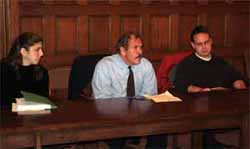Levine Talks About Rebuilding Education in Afghanistan
"There are only two ways to learn about a country; spend a week there or live there for years," said President Arthur Levine, addressing a group of students who were eager to learn more about the week that Levine spent in Afghanistan, cementing Teachers College's presence in the redevelopment of the country's education system. Levine's talk was a "casual conversation" sponsored by Student Life.
This past summer, several faculty members traveled to Afghanistan to participate in a conference on the development of textbooks for the country and will now be working closely with the Ministry of Education to establish a teacher education program in the war-ravaged country. (Check Inside TC Online for related articles.)
It was TC's involvement in this reconstruction effort that attracted students from several different departments to the lunchtime discussion. In particular, Levine spoke about his impressions of the country and the daunting, yet exciting, task ahead of the Teachers College team and the Afghan government.
"Afghanistan is a country with a literacy rate of 31 percent, 15 percent for women," said Levine. "When one flies into Kabul, a city of 4 million, much of it is rubble. The taste of Kabul is one of dust-dust in your clothing, in your hair, from that rubble." He spoke of former villages, which are now just green fields, a highway system that appears and disappears among boulders and destroyed soviet tanks.
However, Levine is hopeful and believes that building the education system is a part of rebuilding the country. TC hopes to help Afghanistan develop the professional development resources to train their own teachers and leaders.
Textbooks, said Levine, are the way to begin both professional development and start a national curriculum. Teachers in Afghanistan most often have a 9th grade level of education. Finding time for professional development is hard because teachers need to work two other jobs to supplement the three-dollar-a-month salary they receive.
"This is a country where the textbook is the curriculum, because you are talking about teachers with a 9th grade education. The one chance you have to build the curriculum is the textbook that you create," said Levine. "We are creating a textbook and using that textbook for both professional development and for teaching. Our faculty is working on putting all that together and creating the professional development and curriculum materials."
"One experience I remember most vividly," said Levine, "was walking into a classroom where there were 60 girls sitting on the floor-no desks, no chairs, no paper, no textbooks, and seeing 60 girls who two years ago couldn't have gone to school because they were barred by the Taliban-studying mathematics, and realizing that right now, two-thirds of all the boys and one-third of the girls in the country are in school. There are 4 million children in school, but there are still 4 million other children not in school. There are also millions of bypassed girls who, during the Taliban era, didn't get to go to school and now need to catch up in some fashion."
Levine ended the discussion with a question and answer period. He also invited doctoral students with relevant expertise to consider joining the project.
Published Friday, Dec. 19, 2003
